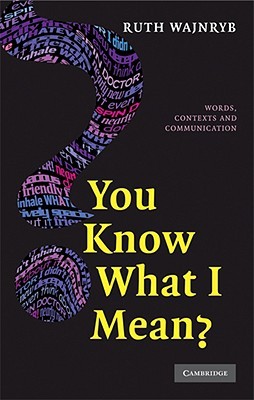
- We will send in 10–14 business days.
- Author: Ruth Wajnryb
- Publisher: Cambridge University Press
- ISBN-10: 0521878853
- ISBN-13: 9780521878852
- Format: 13.7 x 21.6 x 1.5 cm, hardcover
- Language: English
- SAVE -10% with code: EXTRA
Reviews
Description
Does a word mean what it says? Sometimes - but not always. Everyone thinks that meaning is contained within words - like sardines in a tin, or milk in a bottle. After all, words are nice stable things that you can look up in a dictionary aren't they? But dictionaries only take us so far... If you eavesdropped on a teenage conversation, rushing to a dictionary - with its definitions frozen in time - wouldn't help much. Who's using a word and to whom, in what context, for what purpose - all these influence the meaning of the language we use. The word's origins and history (its 'genetics') also help. Try teaching yourself another language from a phrasebook and you'll soon learn that you can be correct, in the formal sense, but still way behind the times in reality. In this book Wajnryb considers these and other questions to explore how and why our language works the way it does.
EXTRA 10 % discount with code: EXTRA
The promotion ends in 18d.08:25:13
The discount code is valid when purchasing from 10 €. Discounts do not stack.
- Author: Ruth Wajnryb
- Publisher: Cambridge University Press
- ISBN-10: 0521878853
- ISBN-13: 9780521878852
- Format: 13.7 x 21.6 x 1.5 cm, hardcover
- Language: English English
Does a word mean what it says? Sometimes - but not always. Everyone thinks that meaning is contained within words - like sardines in a tin, or milk in a bottle. After all, words are nice stable things that you can look up in a dictionary aren't they? But dictionaries only take us so far... If you eavesdropped on a teenage conversation, rushing to a dictionary - with its definitions frozen in time - wouldn't help much. Who's using a word and to whom, in what context, for what purpose - all these influence the meaning of the language we use. The word's origins and history (its 'genetics') also help. Try teaching yourself another language from a phrasebook and you'll soon learn that you can be correct, in the formal sense, but still way behind the times in reality. In this book Wajnryb considers these and other questions to explore how and why our language works the way it does.


Reviews